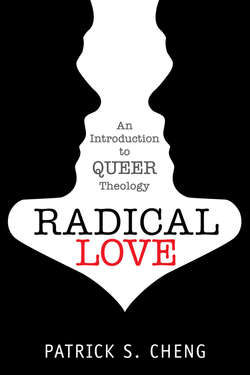Читать книгу Radical Love - Patrick S. Cheng - Страница 20
На сайте Литреса книга снята с продажи.
Queer Experience
ОглавлениеFinally, queer theology draws upon experience as a source for theology. As in the case of other contextual theologies, queer theology is premised upon the belief that God acts within the specific contexts of our lives and experiences, despite the fact that LGBT lives and experiences have been excluded from traditional theological discourse. Indeed, queer experience is an important—if not critical—source for doing theology from a queer perspective.
In recent years, there have been a number of anthologies of the voices of LGBT people of faith, including From Queer to Eternity: Spirituality in the Lives of Lesbian, Gay and Bisexual People; Recreations: Religion and Spirituality in the Lives of Queer People; Queer and Catholic; and Sanctified: An Anthology of Poetry by LGBT Christians.44 These anthologies are helpful sources in terms of articulating experience as a source for queer theology.
Queer theologians of all backgrounds and perspectives have used experience as a source of theology. For example, Robert Shore-Goss has written provocatively about his erotic love for Jesus in constructing a queer christology. Shore-Goss tells us that, while a novice with the Jesuits, he imagined a “naked Jesus as a muscular, handsome, bearded man.” Shore-Goss wrote that, later on, during “passionate lovemaking, I felt Christ in a way that I only experienced in my solitary erotic prayer.”45
Carter Heyward, an openly lesbian theologian and professor emerita at the Episcopal Divinity School—and one of the first female priests in the Episcopal Church and the wider Anglican Communion—has written about finding God in her sensual and embodied connection with nature while walking with her dogs. She writes that, in observing the “trees’ gnarled roots at the water’s edge, the wind-chill whipping my cheeks, the pile of dog shit I step in, the crows harping from the fence, the joggers and other walkers,” she knows that her sensuality is her “most common link” to the rest of the earth and “can be trusted.”46
Laurel Dykstra, an openly bisexual theologian and member of the Catholic Worker movement, has written about how, as “a Canadian living in the United States, a bisexual person, [and] a theologically educated lay person,” she is always living in “in-between spaces.” As such, her sexuality and spiritually are closely connected. Indeed, Dykstra’s in-between experience actually helps her to “live and love joyfully and defiantly, like Jesus embracing the glorious ambiguity and refusing to be held by purity codes, gay or straight.”47
Finally, Justin Tanis, a self-identified transman and ordained Metropolitan Community Church minister, has written about how his theological work arises out of the intersections of his personal experiences as a “transsexual person” and his “professional life as a clergyperson.” Tanis described how his calling in terms of gender was “remarkably familiar to me; it was like my experience of discerning a call to the ministry.” Like his vocational call, the journey of transitioning for Tanis was a “journey to authenticity, a deeply spiritual process.”48
By writing about their experiences of encountering God within their particular social contexts, each of the above queer theologians have shown that experience is a central source for “talking about God” and doing queer theology.
